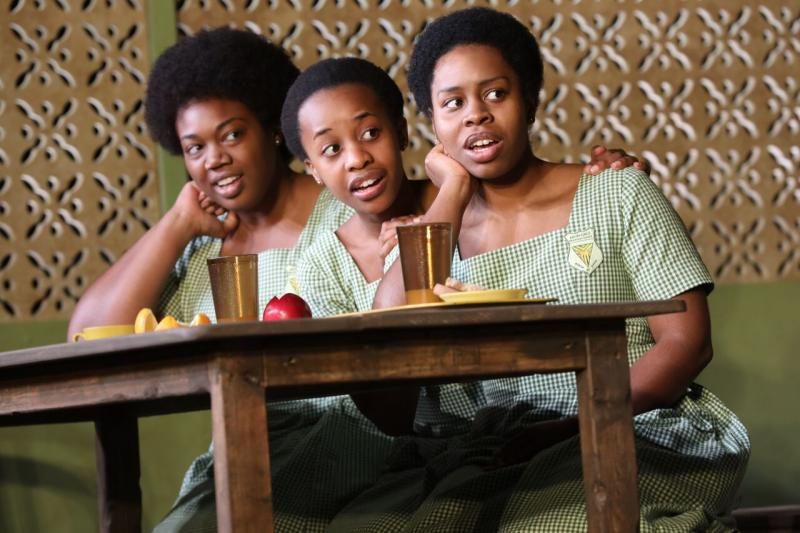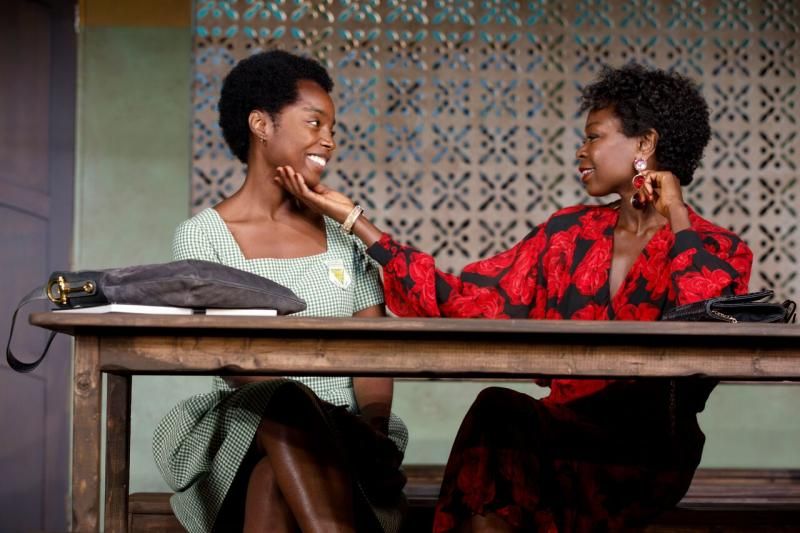Review: Jocelyn Bioh's SCHOOL GIRLS; OR, THE AFRICAN MEAN GIRLS PLAY Addresses Issues of Beauty and Skin Tone
Though the teenage girls at the center of Jocelyn Bioh's endearing and poignant School Girls; or, the African Mean Girls Play all have wonderful qualities that should be appreciated and nurtured during their years at Aburi Girls Boarding School in central Ghana, there is one quality that prevents them all from having a chance to represent their country in the 1986 Miss Universe Pageant. They all look like a teenage girl from Ghana.

and Paige Gilbert (Photo: Joan Marcus)
Or, to be blunt, their physical features, especially their dark skin tone, don't match the westernized standard of beauty (code words used are "universal" and "commercial") that those choosing their nation's representative regard as the unspoken requirement to succeed in the international competition.
Director Rebecca Taichman (Tony winner for last season's INDECENT) delivers another spot-on production, with Bioh's realistic blend of humor and bite swiftly making its points in a play that's solidly satisfying in just 75 minutes.
While the tough, but loving headmistress Francis (Myra Lucretia Taylor) keeps her students in line, it's the verbally cruel and confident Paulina (MaameYaa Boafo) who is the self-styled role model for success, femininity and cool points.
Her close at hand lackeys, cousins Gifty and Mercy (Paige Gilbert and Mirirai Sithole) make sure words of praise are always in earshot, particularly when the studious Ama (Nike Kadri) and the larger-sized Nana (Abena Mensah-Bonsu) are around.
The girls are obsessed with all things American, though they don't always grasp the culture accurately. Paulina impresses the others by telling how her brother in America works at that famous restaurant White Castle and sends her exotic gifts from stores like Conway and that exclusive shopping district, Chinatown.
So you can imagine the excitement when they learn that the newly-arrived student, Ericka (Nabiyah Be), has transferred to their school after living in America. Of mixed racial heritage, the sweet and graceful Ericka has light skin and "commercial" features.
And she's arrived just in time to be seen by the posh and poised representative from the Miss Ghana division of the Miss Universe Pageant, Eloise (Zainab Jah). The former Miss Ghana of 1966, Eloise scouts for potential pageant winners, or at least finalists, and is especially under pressure to satisfy sponsors this year.
So even though everyone up to now had assumed Paulina would be the obvious choice, the new girl's arrival makes it a new ballgame.
Bioh's inspiration for the story was taken from the situation involving Ghana's 2011 Miss Universe contestant, Erica Nego. Born of Ghanaian and American parents, Nego had previously won the title of Miss Minnesota, and had competed in the 2009 Miss U.S.A. Pageant. Her selection as Miss Ghana was a controversial one, as the rules regarding qualifications were stretched to allow the light-skinned woman to compete.

(Photo: Joan Marcus)
In Bioh's play, Paulina (who has been harming her body using skin lightener), fully understands the advantage Ericka has over her and plots to discover if she truly qualifies under pageant rules.
Though they all know they have no chance of being selected, Francis encourages all of her girls to be seen by Eloise, and the play's sweetest moment comes when they participate in a group sing of Michael Masser and Linda Creed's "The Greatest Love Of All," where each has a solo moment.
Paulina sells the song aggressively and Ericka displays professional polish, but the joy of the moment comes when watching the young women with limited singing capabilities cheerfully having their moment in the spotlight.
With the rest of the play being funny and issue-oriented School Girls; or, the African Mean Girls Play, is most touching when focused on the nice girls.
Reader Reviews
Powered by
|
Videos

